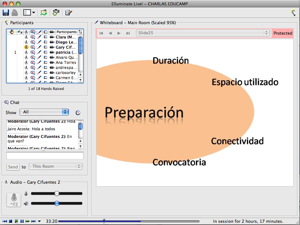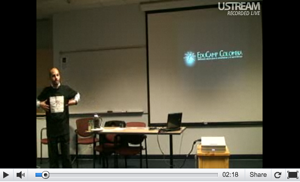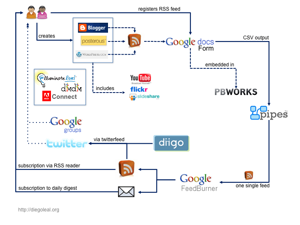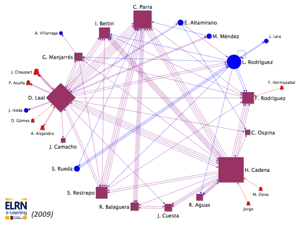New workshops were developed by teachers from different institutions. I was invited to facilitate one more at EAFIT University.
In addition, we did a workshop with staff from the Colombian Ministry of Education. It was an opportunity to test the format with a different audience and a different focus: the development of personal knowledge management skills. Also, it was the first workshop to use a subtitled TEDTalk*.
As new people started to do workshops, conversations with EduCamp volunteers were held online, to exchange ideas and findings.


A few weeks later, a shorter version of the workshop was tested at Saltillo (México), with primary school teachers and a (very) different setup. It worked very well, nonetheless, and helped us see that what we were seeing in the workshops was related to the quality of relationships fostered, not just to the technology or spaces that were used.
Then, in October, a new national workshop was made during the National Education Forum held by the Ministry of Education in Bogotá. This one mixed in the same space, for the first time, teachers of every educational level and even students.
Our wiki was included in other courses developed by different institutions, as part of their learning resources.
Finally, our experience was used by the Ministry of Education and Culture of Misiones (Argentina) as a starting point to do their own EduCamp in November.
*Barry Schwartz's 'Our loss of wisdom', which I heard live while attending TED@PalmSprings 2009, thanks to an academic discount by TED and the support of EAFIT University (Colombia).
After moving from Bogotá to Rio de Janeiro, I started to explore how to bring into an online environment the ideas and possibilities we developed in the EduCamp.
Based on the work on Open Online Courses (OOC) developed by people such as David Wiley, Alec Couros, Leigh Blackall, Stephen Downes and George Siemens, I set out in September to do the first Spanish-based OOC offered in Colombia (and, as far as we know, in Latin America).
Using public tools, I created a distributed, decentralized space that allowed each participant to get in charge of his/her own learning experience, while sharing actively with others. Given that all applications and services were public, any teacher could replicate it by himself/herself for his/her own courses.

This first course was called e-Learning, offered by Universidad de la Sabana (Bogotá). All contents and activities were published online under Creative Commons licenses, so anyone interested could build on them for their own learning experiences. In this sense, the whole experience produced many Open Educational Resources.
But I wanted to explore other things as well. I tinkered a bit with some possibilities of network visualization to provide feedback to participants, which I shared on my blog:

Alter this first course, it was time to improve the information infrastructure I had built and to explore a bit more how visualization could help both facilitators and participants.
In October, I used some of the first TED Talks translated by the TED Open Translation Project as a trigger for discussions about the future with teachers, researchers and administrators, in an event at the National Education Forum held by the Ministry of Education in Bogotá. We called this experiment EduCafé.